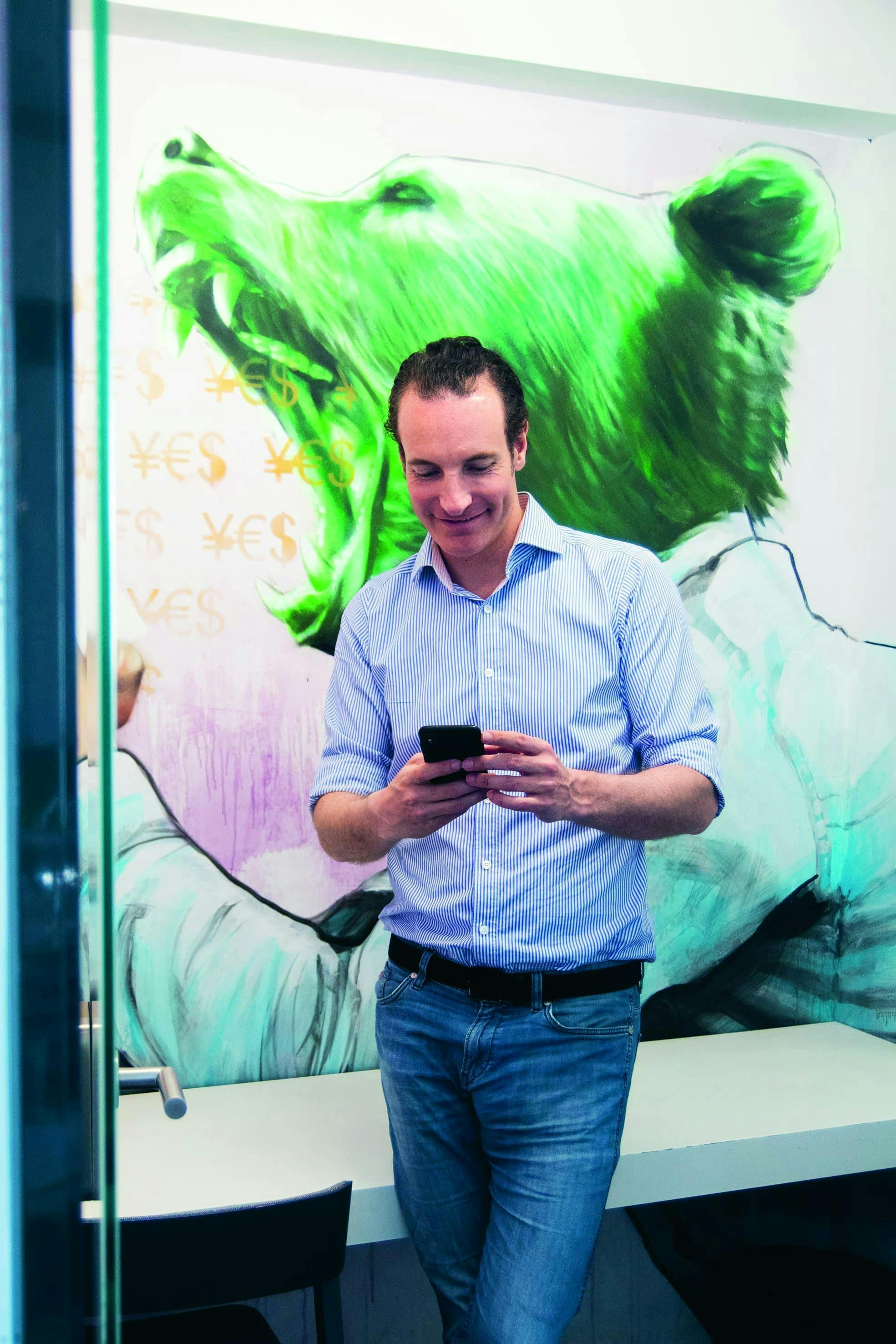"The real disruption has never come from the inside": A conversation with the cofounder of mobile bank N26
urious to know about the German bank that’s shaking things up in the fintech world? Maximilian Tayenthal, cofounder and CFO of N26, shares some of the lessons he’s learned from building one of the fastest growing banks in Europe.
There might not be an industry less open to innovation than banking. With an essential service to offer and high barriers to entry, the established giants have little incentive to change. This is where Berlin-based N26, which claims to be Europe’s first mobile bank, comes in.
Founder Valentin Stalf and cofounder Maximilian Tayenthal saw an opportunity several years ago when they realized that the banking industry was in need of disruption. Responding to a significant shift in user behaviour, N26 has over the past five years revolutionized the banking experience for their customers, making it more simple and user-friendly.
In June, N26 announced it had topped one million European customers and €1 billion in monthly transfers. More recently, in early October, the company announced its beta launch in the UK. In spite of all this, Maximilian told Startup Guide that he and the majority of the N26 team don’t have a background in finance. He insists that N26 is more of a tech company than a financial company.
So how exactly did N26 come to be? And what were the challenges and lessons learned for two people wanting to disrupt an industry built up on brick and mortar banks? Maximilian sat down to chat with us recently and touched on these very points.

Maximilian Tayenthal in the N26 office in Berlin. Photo: Daniela Carducci / Startup Guide
What does N26 do?
N26 offers a mobile-first bank account for all banking customers looking for modern and digital banking. We founded the company because we saw that there's been a massive shift in user behavior, going from offline to online to mobile, but the products of the big European banks are super old school and no one is providing a great user experience. So, we started N26 to provide a very slick user experience, along with lower prices than basically any other bank throughout our markets.
What made you want to build a finance company? It's not the easiest sector to break into.
When we started N26, we believed, and we still believe today, that financial services is the area most ripe for disruption. If you think about it, we've had this shift in user behavior that I just described, but at the same time you still have these really old-fashioned incumbent banks that do business the same way they did centuries ago. There's been very little change.
Founding a startup is by far the most meaningful thing I've done.
If you look at the other industries that have been disrupted by startups and mobile technology, the real disruption has never come from the inside – from the existing giants. It wasn't the big travel agencies that founded Booking.com, and it wasn't Blockbuster that founded Netflix. There are many more examples like that. So we thought there was a massive opportunity here that traditional banks weren't going to take.
And we saw that the banking market is extremely fragmented, mainly for historical reasons. You have French banks for French customers, German banks for German customers, Italian banks for Italian customers. We’re the only ones based on one IT platform and one banking license, so we can take on customers from all over Europe. It gives you much better economies of scale.
How have you navigated a field populated by such established giants?
Well, there's a lot of fintech startups working with or around banks, but that's not what we do. We're really competing with the big European financial institutions. We want to win millions of customers, and that means we have to take millions of customers away from Sparkasse, and millions from HSBC, and millions from BNP Paribas and all the other big banks.
But it's important to remember we're more of a tech company than a financial company. That means three things: First, we have a brutal focus on the product and the customer. We've thought a lot about how we can provide the best user experience for the customer and how we can provide the best user interface.
Second, now that we have a banking license, we can introduce a variety of new innovations to fully disrupt the industry. So while N26 is known by many people for providing one of the best interfaces on the European market, we also have the most modern infrastructure on the European market. For example, we built a modern core banking system, which is kind of the main accounting software for a bank – ours is much more advanced than those of traditional banks, which use systems that are forty years old. We're hosted entirely on the Amazon cloud, which allows us to offer our services at much lower costs.
Third, we acquire customers at a fraction of the cost of other banks. We invest so much in the product that we’re very much preferred by our customers, and we have five-star ratings in the app stores. All these things lead to lower customer acquisition costs, and we can pass on these savings to our customers.
What lessons could you draw from that experience for others breaking into established sectors?
One, I think you really have to focus on the customer. You have to think about the problem you're really solving. Today, with every feature we're launching and every product we're building, we're thinking about the customer. Is this really solving a customer's problem? It's important to think about that, because we've had to prioritize scarce resources and only spend money and time on the things that address the actual needs of our customers. So that’s the first lesson: to really focus on the customer.
Two, I think you have to be very data-driven. You have to launch a product as early as possible and also get customer feedback as early as possible. Those are two of the very important learnings we took away.
What have you learned from customer feedback?
Unfortunately, I can't be very specific about particular products, but I can say a few general things. One is that when we've launched in new markets, we've usually launched in several markets on the same day – we launched in Spain, Italy and France that way – and this drives you to want to make hypotheses and compare results. You might have a theory that one market will perform stronger while I might have a theory that another market will perform stronger, and then you launch and see that a third market is three times as strong than the other two combined.
We still believe today that financial services is the area most ripe for disruption.
Or sometimes you're totally wrong with your hypotheses and even your basic assumptions. For example, we were really surprised by the success of our premium product, a paid account with a paid card and additional features. We were also surprised by how well our international markets did. Conversely, we built certain products that needed a lot of effort on our side, but which showed much lower adoption rates than we’d expected.
What made you want to found your own banking startup?
Six months after launching our product, we already had fifty thousand customers. We were working together with a partner bank and didn't have a single person at N26 who had ever worked in retail banking – we were doing banking without bankers. Now we have a banking license, so we have a couple of people who have experience with traditional banks, but we're still a tech company. The majority of the people here work on tech and the user experience of the customer.
You don't need to be out of an industry to really disrupt it. Like I said before, it's not always the retailers that provide the best e-commerce stores. It's not the music industry that built Spotify. You don’t need to come from the industry to design a new product. The skills you need to succeed in one online space are the ones you need in another too.
But you had a few “normal” careers before. What made you decide to found your own company?
Right, I had corporate jobs, legal advisory jobs, consulting jobs. For me, I really wanted to disrupt an industry. And founding a startup is by far the most meaningful thing I've done. There's a steep learning curve – it's a very challenging job – but in terms of impact, you can build so much more that way. We really want to build a bank that changes the lives of millions of people, and that's only possible with a startup.
Then, obviously, in a startup you can build your own team, and work together with people you really like. And a startup is such a fast-moving field. We started with an idea five years ago, launched three years ago, and now we have a bank with about a million customers.
Since leaving your traditional jobs, what have you liked or disliked about the founder lifestyle?
If you have an idea and found a startup, it's a really big bet you're taking – you and the people you found your company with – and if it works out, obviously it's super exciting. It's this steep learning curve, but also the opportunity to have an impact and disrupt an industry. If you look at the corporate world or consulting, you're getting paid a nice salary and you have much higher job security, but the impact you have is generally much lower.
This interview was originally published in our Startup Guide Berlin Vol. 4 book in June 2018.
Main photo: Daniela Carducci / Startup Guide
*This article was originally published on October 17th, 2018 and updated on January 15th, 2019.
